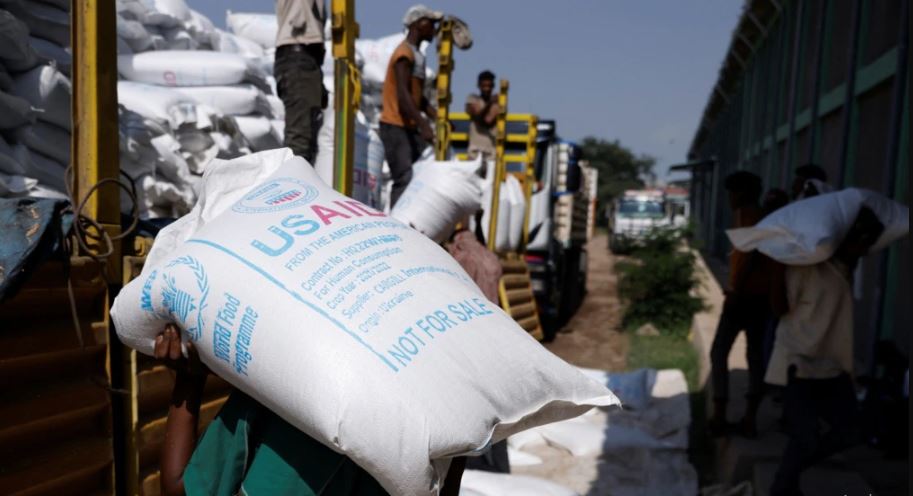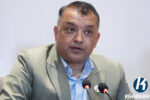WASHINGTON: Ukraine, Turkey and the United Nations worked to keep grain shipments moving through the Black Sea Monday after Russia suspended its participation in a U.N.-led grain initiative.
“Civilian cargo ships can never be a military target or held hostage. The food must flow,” Amir Abdulla, U.N. coordinator for the Black Sea Grain Initiative, tweeted Monday.
The U.N. said there was a joint agreement on a plan for 16 vessels to move through the maritime humanitarian corridor, including 12 heading from Ukrainian ports toward an inspection area off Istanbul.
A Sunday statement also said Turkey and the U.N. would provide inspection teams with a goal of inspecting 40 vessels that have left Ukraine.
More than 9.5 million metric tons of grain and other foodstuffs have left Ukrainian ports since the beginning of August under the agreement struck with Ukraine and Russia to resume the shipments amid a global food crisis.
Russia said Saturday it was suspending its participation, which included providing inspection teams and allowing Russia to export fertilizer, claiming that Ukraine carried out a drone attack against Russia’s Black Sea Fleet off occupied Crimea.
Wheat markets have been volatile due to developments in Moscow’s eight-month-old invasion of Ukraine, as both countries are among the world’s largest wheat exporters.
Chicago wheat futures were up more than 5% early Monday, but still about 30% lower than mid-May levels.
No vessels moved through the maritime humanitarian corridor on Sunday. Among those waiting to pass was the Ikaria Angel, which the World Food Program chartered to bring 30,000 metric tons of wheat to the Horn of Africa.
European Union foreign policy chief Josep Borrell called on Russia to return to the agreement to allow “food to reach the world.”
“Russia’s decision to suspend participation in the Black Sea deal puts at risk the main export route of much needed grain and fertilizers to address the global food crisis caused by its war against Ukraine,” EU foreign policy chief Josep Borrell tweeted on Sunday. “The EU urges Russia to revert its decision.”
The International Rescue Committee (IRC) warned of catastrophic consequences of Russia suspending its participation in the U.N.-brokered grain deal. With the war in Ukraine altering the global patterns of food production and supply, inflation in low-income countries has surged to almost 90%. An estimated 345 million people will experience acute food insecurity this year, the organization said.
As tens of millions of people continue to experience extreme hunger in East Africa, and Somalia teeters on the brink of famine as a result of the worst drought in 40 years, the renewed blockade will continue to impede the import of 80% of the grain imported from the Russia-Ukraine region, thereby driving further hunger, the IRC warned.
U.N. Secretary-General Antonio Guterres, who is “deeply concerned” about the grain initiative, delayed his trip to Algiers for the Arab League Summit by a day to “engage in intense contacts aiming at the end of the Russian suspension of its participation,” U.N. spokesperson Stephane Dujarric said in a statement on Sunday.
“The same engagement also aims at the renewal and full implementation of the initiative to facilitate exports of food and fertilizer from Ukraine, as well as removing the remaining obstacles to the exports of Russian food and fertilizer,” Dujarric said.
Ukrainian President Volodymyr Zelenskyy on Saturday called the Russia’s exit “predictable.” He accused Moscow of “blockading” ships carrying grain since September.
Zelenskyy called for a tough response against Russia from international bodies like the U.N. and the G-20 group of the world’s major economies.
Speaking to reporters in Delaware Sunday, U.S. President Joe Biden called Russia’s decision to suspend participation from the Ukrainian grain deal “purely outrageous” and said it would increase starvation.
“There’s no merit to what they’re doing. The U.N. negotiated that deal and that should be the end of it,” Biden said.
U.S. Secretary of State Antony Blinken said in a statement, “In suspending this arrangement, Russia is again weaponizing food in the war it started, directly impacting low- and middle-income countries and global food prices and exacerbating already dire humanitarian crises and food insecurity.”
Blinken said the U.S. is urging “Russia to resume its participation in the Initiative, fully comply with the arrangement, and work to ensure that people around the world continue to be able to receive the benefits facilitated by the Initiative.”
VOA









Comment